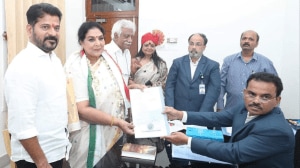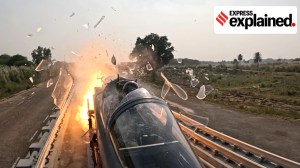‘Aviation’s been treated as a glamour industry, not as core to development…’
• You’ve got job your job cut out. Mumbai is not the kind of airport that makes India proud. Premier airport. All of the world...

• You’ve got job your job cut out. Mumbai is not the kind of airport that makes India proud. Premier airport. All of the world’s businessmen, investors, they all land here.
Certainly. I think it is really something to be worried about. It’s something which I think all of us as a nation must address because air travel and airports have always been treated as something very elitist, something for the rich, something which is just an absolute necessity for a certain class of people, and therefore, it has never been integrated into the mainstream of our country and that is exactly what I think is my biggest challenge, a job which I have to perform in the next few months… years…and whatever I can do in the shortest possible time.
• Don’t take too many months or years. Because there isn’t that much to fix if you get your fundamentals right.
I agree. I absolutely agree with you. Because what is the big issue of getting this place (Mumbai airport) right? I’ve just now commenced the work on sprucing up a terminal and I think it’s going to be ready in six months. What prevented anybody to take such decisions in the past? When I came in to the ministry, everybody said that ‘For seven years, Delhi and Mumbai airports haven’t been touched because we thought we will be going in for a joint venture some day and the potential partner will spend the money’. But this could have been done.
• The funny thing is, in five consecutive budgets, weren’t we promised new airports in Delhi and Mumbai? And nothing moved.
Exactly. That’s the point I am making. What I am attempting to do in six months, just to give a facelift to the Mumbai terminal, could have been done by anybody.
• That’s just a facelift. When are we going to get the new airports?
I am very committed, I think the government is very committed, the Prime Minister is very committed that we want world-class A terminals not only in Mumbai and Delhi, but all over the country. And therefore, we are beginning with Delhi and Mumbai. We have already got expressions of interest from nine interested parties. We are going to release the document in February itself. By the middle of this year, we would have found a joint venture partner for both Delhi and Mumbai. And the agenda is not just sprucing up these airports.
• When you are saying middle of this year, you are really pushing the deadline. Because it was December, then it was March…middle of this year could mean anything.
There are some problems which I have inherited. In the sense that the entire exercise for these airports was not completed. There are many issues. In Mumbai, there are land issues, there are slum issues. In Delhi also, there are so many issues which have not yet been addressed. But we have, I can assure you, burnt the midnight oil…
• Are you putting any deadline to this? April, May, June?
We’ve capped it. By June 30, we have to complete the process. As far as release of documents is concerned, we are completing the process in February.
• June 30 is exactly half-way mark of the year. So you’ve really stretched to the half-way mark.
No, it’s not that way. We just came in eight months ago. And in this span of time, there have been problems. We have changed the terms of the contract because we also have sympathies for our friends who are going to be working in these airports. They are ultimately the people who have made these airports happen in the country. Right or wrong, you can’t blame everything on the employees.
• Employees are mostly not to be blamed. Employees are a very small number of people.
Exactly. That’s what I am saying. There was no thought process as to what should be done for them, how they will be brought into the mainstream of decision-making. And that’s all we have been endeavouring. And I think now everybody is seeing reason.
• What was your most embarrassing moment at an Indian airport? For me, the most embarrassing moment was the loss of Instrument Landing System (ILS) antenna in Mumbai, which nobody ever explained.
That is one of the most embarrassing moments. How can you have an airport which is supposed to be secure, and an antenna gets stolen right on the approach path of the runway, within the airport periphery? I have no words to explain.
• Have you found out something?
I was told that the antenna was a copper rod and some labour just took it for scrap value but did not realise that it disrupted (services in) the airport for a good 48 hours.
• And the whole world came to know of it.
Absolutely. It’s something if we don’t take it into account, we would have to cut a sorry figure. The real challenge is we do not look at airports and air connectivity as something which is very important to the economy of India. After all, if we do not have air connectivity, how does this country grow? How does it prosper? Singapore, Dubai, one city state on either side of India, have more numbers of passengers than India.
• Even Pakistan has much better airports than India.
I have been to Lahore, I have been to Karachi and I have no hesitation in admitting that their airport management, their airport terminals are much much better than what we have today.
• Except they (Pakistan) are privatising their airlines now. They are throwing some equity in the market now. They are putting them on the block.
One of the things I must admit is that Air India and Indian Airlines have such great potential. But they have been left in such a situation of drift, no policy, no direction.
• But they have to be also freed up from your joint secretary’s control.
That’s exactly what I am trying to do.
• I always say it is the government of joint secretaries. But nowhere does it manifest more clearly or more significantly than in the case of the Ministry of Civil Aviation. Because your joint secretary controls these airlines and doesn’t let the management function… then they become the CEOs of these airlines.
I don’t want to put every blame on the bureaucracy.
• Each incumbent joint secretary has a vested interest in not allowing the current CEO to function because he wants his job.
I am sure there is some little change coming in aviation…
• I think that (change) is coming because you have a good dealership for Indian Airlines, and second, because there is competition, people are being forced to change.
But it’s the same people. We haven’t changed people.
• It’s not the people, system is the problem.
We haven’t brought in any new technology overnight. There is some visible improvement. As you rightly said, we are giving people space, we are giving them the opportunity to show their talent and skills…I don’t think a private carrier vis-a-vis a government carrier, there is any advantage or disadvantage. In fact, government carriers have such good engineering support.
• Not just that. They have sovereign guarantees now to buy their planes. They have committed traffic from government servants. All government tickets have to fly Air India or Indian Airlines. You’ve the Gulf route reserved for them. They are doing all right.
I would think so. But in a competitive era, they will also have to perform, they will have to tighten their belts. After all, nobody is going to fly because you are mandated to fly on a government carrier.
• I have seen senior cabinet ministers going on official trips, say to South Africa, flying British Airways. Delhi-London, London-Johannesburg on some excuse or the other, flights were not available, timings were not available. People all find their ways….
I don’t want to comment on that. Yes, our carriers need improvement, they need to be upgraded to world standards. There are inherent deficiencies. When you talk of misuse by government officials, that’s a small area of concern, I agree. I think the larger picture is not restricted to that area. The larger picture is, can we make Air India and Indian Airlines and our Indian carriers world-class and competitive? According to me, the answer is yes, it is possible, it is feasible.
• What kind of autonomy do you expect the airlines to get now?
When they are buying a plane, we don’t decide who’s going to buy, which plane is to be bought. They decide if they have to grow. And I am the one who’s been pushing them for more and more growth.
• Aviation companies are unusual in the sense that they are almost always headed by IAF officers. Navratnas, other good PSUs, they have all found professional managers. Oil PSUs, BHEL, NTPC, all the good PSUs are now being run by professionals who come up the ranks or who are from the business. What is this stranglehold of the IAF on the aviation PSUs?
I think things are much better. I do not see that stranglehold. Indian Airlines is being run well. Air India is being run well. Problems of Indian Airlines and Air India are different… Now if you tell me for the last seven years, they don’t know whether they are going to be kept in the public sector or they are going to be sold, they don’t have direction, they are not allowed to buy aircraft…how do you expect the airlines to perform? Even if I was the best manager or you were the best manager, how would you be able to do something in such a restricted environment? I think everybody, even the political leadership is responsible for this.
• So it was seen as a small milch cow in which people of India were by and large not interested. So you could quietly do what you wanted with it.
Aviation has only been treated as a glamour industry, it has never been treated as something which is core to infrastructure and development of the country.
• As a politician and as an entrepreneur, what were your biggest surprises when you came to this ministry. This is, of course, a big responsibility.
Yes, it is my big responsibility and I do admit that I was pleasantly surprised. The fact of the matter is that…can we not make this sector grow to a size which cannot be imagined as of now?…This country has the best aviation infrastructure in terms of Indian Airlines and Air India. The technical infrastructure is world-class.
• But it was also very bureaucratic. Once I called this the ministry of un-civil aviation. But what was the one big surprise? Was it something somebody said to you, something you discovered, something that sounded very logical or unreasonable?
I don’t want to go into that aspect. From day one, my dream was that can India not be one of those countries where people actually fly as we travel by train in India? We are a billion plus people. We are a continent by ourselves. And do you know how many planes we have? Only 175. Including the turbo props, the smaller jets…I am talking of the commercial aircraft, not the private aircraft. And the United States — with a third of our population — has 8,000 commercial planes; West Europe has 5,000 commercial planes.
• China has many times more.
China has 800 planes by now. Fifteen-twenty years back, they were smaller than us in aviation. And today, they are five times our size. Why can’t we do that?
• You can say that the only area in which we will leave the Chinese behind in the next 10 years is population.
That is one area which is really going to bother our country. Though we may talk of a big human resource base, we also have that many mouths to feed. That many jobs to create. Not an easy thing. Therefore, I look at my ministry as one of the biggest job creators for the country in the years to come. Nobody else looked at it. We have three million tourists a year, half of them are our own people, who come back to India to visit their relatives.
• Sri Lanka and Maldives get more real tourists than India.
Exactly. Real tourism. It could have a phenomenal multiplier effect on India… There is a lot of buzz in aviation in India. I can assure you that the kind of direction it requires, that is the biggest challenge before us. Unbundling the bureaucratic procedures, unbundling the controls of government.
• As a reformer, I believe the NCP is the most unabashedly reformist element in this coalition. So, as a reformer, somebody who believes in the private sector in unbundling creative energies, isn’t the Ministry of Civil Aviation a kind of contradiction in a reformist economy?
I don’t think so. I am doing my job conscientiously. I am only doing what has not been done all these years.
• Because more and more countries have replaced the ministry with a civil aviation authority. When do we see us evolving to that level?
We are coming up with a regulatory mechanism very soon. In fact, for the airports, we are coming up with a regulatory authority as early as in a month’s time.
• When do we evolve so much that we don’t need a ministry of civil aviation?
I would be happy to unbundle most of these procedures which we have now. We really could do with a department of civil aviation maybe in future.
• If your airlines are autonomous, if your regulators are in place, then why the ministry?
Airport Authority itself can be a good vibrant company, Indian Airlines and Air India can be vibrant companies on their own. We will give some shares to the people, some to employees. I am definitely talking about going public for Air India and Indian Airlines. We are going to give ESOPs. That’s where the commitment is going to come from within.
• And you’ll get the joint secretaries off the back?
Nobody is coming as an obstacle in our path to progress. We are working as a team.
• Don’t you see a logical process whereby in a few years, this ministry shouldn’t be necessary?
I 100 per cent agree with you. In five years, if I can achieve some of the milestones which I have set for ourselves, we could be actually talking about a department of civil aviation. It is possible. We want the government completely out of the decision-making process. Let there be a fair, transparent regulatory mechanism.
• What happens when somebody (potential investors, tourists) comes to India?…From a landing position in Mumbai, what one gets to see is one of the biggest slums.
It is very unfortunate. It is a social problem. This is happening all over Mumbai. It’s a major problem in terms of security, development of the airport. We have almost 3,00,000 people living within the Airport Authority land.
• So how much of your land has gone?
We are just going into a detailed survey, which should be with us in a short time. We have a policy of the government in place, where once we give them rehousing, they will have to go…All major airports in the world have two runways. We could have done it in Mumbai, but we don’t have the land. Mumbai needs a big surgery.
• Some of the problems in our country are generic. Some of those come from politics.
Absolutely. Actually all big cities have been looked upon as profit centres. Therefore, we have to correct these wrongs.
• Where do you see yourself in politics?
I don’t want to copy anybody. I want to do my job conscientiously.
• You don’t find yourself to be an oddball?
No. I have been thrice a member of the Lok Sabha. I have been a mayor of a municipality. I wouldn’t be here if I weren’t an acceptable commodity.
- 01
- 02
- 03
- 04
- 05































